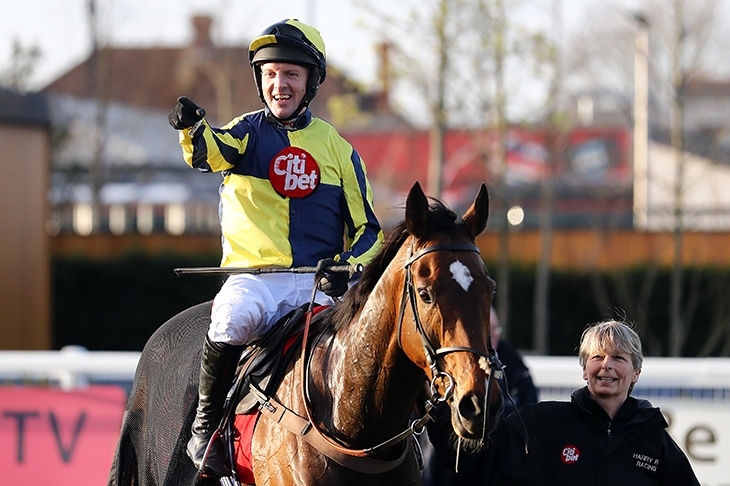As jockeys, trainers, punters and media folk gathered at Newbury on Saturday to say farewell to Noel Fehily, the ultimate professional who fittingly rode Get In The Queue to victory in his final race before retirement, I couldn’t help contrasting his departure with the picture of her Cabinet allies and those lovely forgiving folk in the ERG jostling simultaneously to force Theresa May out of No. 10, with a crowbar if necessary. Racing does its farewells decently whereas political careers almost invariably end in tears. Mrs May once had a share in Dome Patrol, a winner trained by Willie Muir, and she could do worse than seek solace in the racing world when she finally emerges from her Brexit morass.
A truly sympathetic horseman whose honest and penetrative opinions on his mounts were valued by leading trainers, Noel would never have made a politician, one of those people who tell lies to journalists and then believe what they read. Self-promotion isn’t his thing. Years ago I remember meeting Noel over breakfast at Charlie Mann’s yard when he was starting to earn notice as the Lambourn trainer’s conditional jockey. I hoped to get two interviews for the price of one but the young Fehily was so modest and reticent that nothing was forthcoming: had we been dinner guests together it would have been a struggle from the starter on. He let his riding do the talking. As champion jockey Richard Johnson put it: ‘He’s not a man who shouts and screams, he just does his job and deals with everything.’
Racing is as fiercely competitive as politics but, particularly over jumps, it retains a joie de vivre and generosity of spirit that has somehow drained out of the political scene, summed up for me that day by trainer Neil King. Asked if he wasn’t being rather optimistic about future prospects after equalling his best season’s total when The Knot Is Tied won the juvenile handicap hurdle, Neil replied: ‘Of course I’m optimistic. I’m a trainer of racehorses.’ I worry, though, that some of the rancour and pessimism that Brexit has brought to our national life is spreading, notably into the differences of opinion between the British Horseracing Authority, responsible for the governance, administration and regulation of racing, and the professionals who train and ride racehorses.
It all came to a head with the National Hunt Chase at this year’s Cheltenham Festival, a gruelling contest over four miles for amateur riders and novice chasers, in which only four of the 18 contestants finished. Three riders were penalised by the Cheltenham stewards, with bans from racing for a number of days, for persevering in the race after the stewards believed they should have pulled up their mounts. Declan Lavery, rider of Jerrysback, trained by Philip Hobbs, was given a ten-day ban after finishing third, the stewards taking the view that Jerrysback had no more to give after jumping the penultimate fence and that by continuing Lavery was acting against the horse’s welfare.
As it happens, I have taken a particular interest in Jerrysback. Impressed by his early promise, I selected him as one of our Twelve to Follow through the winter of 2017–18, but after an injury he missed the rest of that season. I normally keep an eye on Twelve selections for a while, but after Jerrysback’s warm-up comeback race following 633 days off, I failed to spot his next appearance at Bangor where he won at 50–1. You don’t forget 50–1 winners you have missed and I watched his effort in the National Hunt Chase closely although without financial interest. Remember that as well as the welfare of the animals they are riding, jockeys have a duty of integrity to ride every horse to achieve the best possible placing. Jerrysback certainly slowed but he jumped the last fence reasonably, he was not visibly distressed and when he was challenged on the run in Lavery did not make use of his whip. The horse was not examined by a vet after the race and trainer Philip Hobbs told me at Newbury that Jerrysback has been fine ever since Cheltenham.
With leading trainers and former champion jockey Sir Anthony McCoy leading a chorus of dismay at his ten-day ban, Lavery duly won his appeal and the ban was removed. Since then leading figures, including trainers whom I especially admire, have been lambasting the BHA for an excessive concern with welfare, effectively accusing its chief Nick Rust of kowtowing to animal-rights lobbyists. I understand their point: living day-to-day with their animals, trainers care for them more than anyone and resent any implication to the contrary. But let us have a care. As well as regulating racing, the BHA has to be racing’s interface with the political world: that political world is highly sensitive to the animal-rights lobbyists who would love to see some kind of state control take over the BHA’s role.
All of us who care about racing should learn from May’s mistakes. Let all sides in racing keep engaging amicably otherwise welfare could become racing’s Brexit.






Comments